


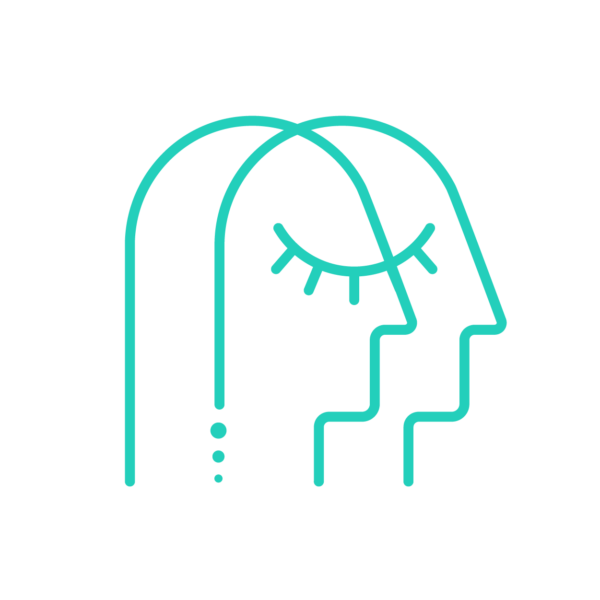

Jump to: Mental Resilience Training | How Healium Works | The Science Behind Healium | Anxiety | Mood | Positivity
Arlington County Police Department Pioneers New Officer Wellness Tools
Less than 20% of police officers seek help for mental health concerns according to a recent article from Walden University.
Law enforcement officers routinely face high-pressured situations that require sound decision making. When you’re stressed, that decreases working memory which increases the likelihood of errors. Whether you’re a police officer, a nurse, or a pilot, these “worker athletes” benefit from drugless solutions to boost their human performance.
 According to the American Police Officers Alliance, alcohol abuse, depression, post-traumatic stress disorder (PTSD), and suicidal thoughts are common mental concerns for officers around the US. In fact, 1 in 4 officers contemplate suicide.
According to the American Police Officers Alliance, alcohol abuse, depression, post-traumatic stress disorder (PTSD), and suicidal thoughts are common mental concerns for officers around the US. In fact, 1 in 4 officers contemplate suicide.
Departments are finding new, engaging ways to improve mental fitness within their own teams. Emerging tactics include destigmatizing seeking help, centralizing resources internally and forming strategic partnerships with health organizations. The Arlington County Police Department has also introduced immersive media for mental resilience training and recovery. Recently, the ACPD launched a wellness initiative for officers through a partnership with Cummings Foundation Behavioral Health.
The new initiative introduces Virtual Reality Stress Management Training using Healium’s software. The officers are using VR headsets to interrupt the stress response, provide vi
rtual nature experiences, and create stored memories that can be recalled in stressful situations.
Five peer-reviewed journal publications show Healium’s impact on anxiety, positivity, and mood improvement. Officers will be able to experience calm in as little as four minutes through these virtual nature escapes that have the option of being powered by wearables that allow the user to see their own brain patterns or heart rate inside virtual worlds.

For more information on virtual reality as a drugless non- harmful coping mechanism for you or your team, visit tryhealium.com.
While you’ve probably heard that meditation is a good practice, many people still don’t know why or how exactly it is beneficial. Meditation has the power to positively reshape the structure of our brains!
If you are curious about meditation, but find yourself routinely asking, “Why should I meditate?” this article is for you.
We’ll discuss the different long-term effects of meditation and how exactly these effects operate, as illustrated in research.
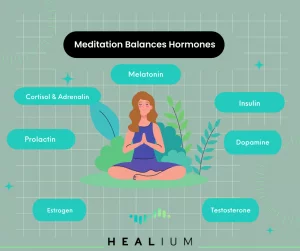 Your brain is an incredible organ, capable of affecting much more than the muscles throughout your body. In fact, the biochemical makeup of your brain may have an even larger impact on your body’s functioning at large.
Your brain is an incredible organ, capable of affecting much more than the muscles throughout your body. In fact, the biochemical makeup of your brain may have an even larger impact on your body’s functioning at large.
That’s why it’s so important to strive for mental fitness, which is a mindset where you treat your brain like the muscle it truly is. This means exercising it regularly through the likes of meditation and neurofeedback so you maintain a proper balance of hormones & optimize your brainwaves.
– Cortisol & Adrenaline
Cortisol and adrenaline are both stress hormones, designed to put your body in tense “flight or fight” mode. When adrenaline is present in higher levels, your blood pressure rises along with your heart rate. Meanwhile, cortisol works to suppress your digestive system and increase your blood sugars.
While there’s certainly a time and place for these specific hormones, balancing their levels during the more normal periods of your day has become more important than ever. Stress at large has become the 21st century epidemic, estimated to be responsible for around 90% of all doctor’s visits.
Mindfulness exercises like meditation have been proven effective at lowering the levels of these hormones and eliminating stress from your life.
– Melatonin
Melatonin is the hormone responsible for keeping our sleep-wake cycles in check and regulating our body’s internal clock. The more melatonin our body produces, the easier it becomes for us to sleep.
Studies suggest that meditation may help increase our melatonin levels. This falls in line with previous research that indicates meditation helps improve sleep issues and reduce insomnia symptoms.
– Insulin
Researchers have noted that regular meditation positively affects risk factors for diabetes mellitus. In a 2006 study, regular transcendental meditation improved the blood pressure and insulin resistance of the patients.
Moreover, the lowered cortisol levels that regular meditation practice brings also allows the insulin in our bodies to work properly.
– Prolactin
Prolactin is another hormone our body produces more whenever we are exposed to stress. At high levels, it can potentially disrupt estrogen and progesterone balance, which in turn can affect our emotional regulation.
By improving our stress levels and responses, practicing meditation can help down-regulate prolactin production. In turn, this may help prevent infertility, acne, and irregular menstruation.
– Dopamine
Research findings suggest that meditation techniques raise our dopamine levels. Getting a surge of dopamine helps improve our memory, focus, and problem-solving capabilities.
Dopamine is one of the “happy hormones” our body releases when we exercise. It causes feelings of pleasure, motivation, and satisfaction. It essentially primes our brains for peak performance.
– Estrogen & Testosterone
Chronic stress and lack of sleep can suppress women’s estrogen levels and adversely influence men’s testosterone release. As such, regular meditation, which reduces stress and anxiety, can aid in raising estrogen and testosterone levels.
Moreover, studies indicated that practicing meditation may boost the production of DHEA or dehydroepiandrosterone. Aside from being an “anti-aging” hormone, DHEA helps produce other vital hormones, including estrogen and testosterone.

One popular benefit of meditation is reducing stress. In particular, a 2013 study noted that mindfulness meditation can help lower cortisol levels. As the main stress hormone in your body, cortisol works with several parts of your body to regulate your mood.
Research has also shown that meditation can help relieve stress as participants experience structural changes in their amygdala. This structure of cells lying in the middle of the brain are the ones responsible for stress, anxiety, and fear.
Meditation is referred to as a mind-body complementary medicine too. It allows you to experience a deep relaxation state and peace of mind. This is because when you meditate, you’re able to remove different conflicting thoughts that keep you preoccupied and give you stress and anxiety.
As a result, meditation can help you improve both your physical and emotional wellness.
In another study conducted in 2014, transcendental meditation, wherein you need to quietly repeat either a sound or word to help you remain focused, has been shown to help reduce teachers’ stress and burnout. By utilizing stress scales before and after the transcendental meditation program, the researchers found out that participants had lower stress levels and burnout.

According to the Centers for Disease Control and Prevention (CDC), around 70 million people in the U.S deal with chronic sleep problems.
So, if you’re wondering “why meditate?” it’s because the practice can help improve your sleep quality.
A 2015 study from JAMA Internal Medicine examined the effect of mindfulness meditation on 49 adults experiencing moderate sleep problems. Results revealed that the participants who practiced meditation had fewer symptoms of insomnia.
They also experienced less daytime fatigue. While sleep-related problems are often caused by worries and stress, researchers noted that meditation can enhance your relaxation response. Moreover, the practice facilitates better control of the autonomic nervous system. As a result, your tendency to be awakened quickly is mitigated.
Meditation improves levels of melatonin too, which has a crucial role in regulating sleep. In particular, slowing hepatic metabolism or amplifying synthesis in the pineal gland makes the increase of melatonin concentration possible. Then, meditation techniques can manage the blood flow of the brain’s executive regions during sleep. Given that meditation practices influence several brain functions positively, it creates mind and body harmony.
At Healium, we’ve developed an application specifically catered to improve your sleep quality through meditation. By combining virtual reality, neurofeedback devices, and sleep meditation experiences, Sleepium provides users with an actionable means to achieve better sleep.
Long-term effects of meditation include managing age-related memory loss too. For example, a meditation technique called Kirtan Kriyas has been shown to help improve the memory of individuals experiencing cognitive decline. Various meditation styles may also enhance the memory and attention of older adults.
Even people dealing with dementia can benefit from meditation’s ability to provide partial improvement of memory. At the same time, the family members who take care of individuals with dementia can manage their stress and cope more effectively through meditation.
A 2017 study on adults experiencing early memory loss reported that meditation practices, along with listening to music, can provide several benefits. These include boosting cognition, enhancing mood and the quality of life, and helping reverse memory loss in older adults suffering from subjective cognitive decline.
Practicing mindfulness meditation may also help you develop a better perception of life. A review on meditation programs, for instance, noted that meditation helps improve symptoms of depression among over 3,000 adults.
A study published in the Journal of Research in Personality emphasized that meditation exercises may mitigate the presence of negative thoughts. Meanwhile, another review noted the potential of meditation to combat depression by reducing cytokine levels. When you’re stressed, your body releases these inflammatory chemicals that may affect your mood and develop into anxiety and depression.
Meditation can help people combat addiction. For example, a 2013 review highlighted that mindfulness-based interventions can significantly lower the consumption of alcohol, cigarettes, cocaine, and other substances. The same review noted other studies that suggest the link between these interventions and reduced cravings.
Another 2014 study reported that meditation can mitigate the risk of substance abuse relapse. It supports your ability to fight the discomfort related to drug cravings and other negative effects, which means that long-term outcomes can be expected.
Given the mental discipline that you acquire from meditation, you can have more self-control. In turn, you become more aware of the things that trigger your addictive behaviors. With meditation, you can control your impulses and emotions better as well as redirect your focus, thus helping combat addiction.
A study conducted in 2018 also focused on the effect of transcendental meditation on individuals treated for alcohol use disorder. Results showed that this practice may help reduce alcohol use, alcohol cravings, and psychological distress.

Meditation practices have been around for thousands of years, and for good reason. While the mysteries of the brain are still being unraveled, there is solid scientific evidence reinforcing the long term benefits of meditation for your mental fitness and overall health of your brain.
These benefits include relieved stress levels, enhanced quality of sleep, improved age-related memory loss, better emotional health and empathy levels, and even help in combating addiction.
What’s more? The advances in modern technology are even further capitalizing on these benefits!
If you want to take your meditation experience to another level, find out how new technologies like virtual reality meditations even further enhance this millenia old practice.
 When supplemented with additional neurofeedback equipment, modern day virtual reality meditation has the power to optimize specific brainwaves, reduce stress, and increase your mental fitness as a whole. You can finally remove the mystery from meditation and track the improvements it’s making to your brain.
When supplemented with additional neurofeedback equipment, modern day virtual reality meditation has the power to optimize specific brainwaves, reduce stress, and increase your mental fitness as a whole. You can finally remove the mystery from meditation and track the improvements it’s making to your brain.
{“@context”:”https://schema.org”,”@type”:”FAQPage”,”mainEntity”:[{“@type”:”Question”,”name”:”Why Should You Meditate?”,”acceptedAnswer”:{“@type”:”Answer”,”text”:”Meditation is a highly successful, non-invasive and drugless alternative to traditional medicines that helps with a number of health issues including: stress and anxiety, balancing your hormones, sleep deprivation, memory loss, managing emotions and addiction.”}},{“@type”:”Question”,”name”:”Why Meditate Every Day?”,”acceptedAnswer”:{“@type”:”Answer”,”text”:”The benefits of meditation are felt the most when practicing a steady and consistent meditation routine. As you become more consistent with your practice, your brainwaves actually alter and your brain more easily reaches the flow state.”}},{“@type”:”Question”,”name”:”Should You Think When You Meditate?”,”acceptedAnswer”:{“@type”:”Answer”,”text”:”You will never be able to truly turn your brain off, which means you will undoubtedly stumble across random thoughts when you meditate. Successful meditation means acknowledging those thoughts and allowing them to pass. “}},{“@type”:”Question”,”name”:”What are the Benefits of Meditation?”,”acceptedAnswer”:{“@type”:”Answer”,”text”:”The benefits of meditation are almost too many to count! Benefits range from less stress and anxiety, to a greater sense of empathy and mindfulness, and even balanced hormone levels.”}},{“@type”:”Question”,”name”:”What are the Long Term Effects of Meditation?”,”acceptedAnswer”:{“@type”:”Answer”,”text”:”The biggest long term effect of consistent meditation is a greater sense of mental fitness for the user, meaning their mental health is in great shape, they experience less stress and anxiety, and can recognize and manage their own emotions. “}},{“@type”:”Question”,”name”:”How Long do the Effects of Meditation Last?”,”acceptedAnswer”:{“@type”:”Answer”,”text”:”The effects of meditation will often last for a few hours, although the method of meditation itself can lead to variation in this number. Fully immersive practices like virtual reality meditation lead to long-lasting effects as does consistent and routine meditation practice in general. “}}]}
Sarah Hill, a former interactive TV news journalist at NBC, ABC, and CBS affiliates in Missouri, gained recognition for pioneering interactive news broadcasting using Google Hangouts. She is now the CEO of Healium, the world’s first biometrically powered VR/AR channel, helping those with stress, anxiety, insomnia, and other struggles through biofeedback storytelling. With patents, clinical validation, and over seven million views, she has reshaped the landscape of immersive media.
Meditation has been scientifically proven to deliver physical and mental health benefits, including improving focus, reducing stress, managing pain, lowering general blood pressure, and even improving sleep.
At Healium, we consider meditation a vital exercise in achieving mental fitness, meaning you should try to develop a meditation routine just like any other form of exercise. A study from Harvard shows that regular meditation helps you sleep better and wake up feeling more rested.
Our tip to developing a daily meditation practice? Begin by scheduling small mini-meditation sessions throughout the day whenever you feel the urge to relax your body and calm yourself in general.
While consistent meditation throughout the day is the goal (especially if it’s supplemented with neurofeedback training like Healium), more often than not people find themselves laying in bed at night wondering how to meditate to sleep right then and there.
In this blog we’ll walk you through the basics of how sleep meditation helps you wind down, what’s happening inside your brain as you drift away, and even teach you step by step how best to meditate in bed right before you fall asleep.
Meditation helps improve sleep conditions by adjusting brainwaves and alleviating internal stress and anxiety, which has been a well-documented strategy for those looking to gain quality rest.
In addition, sleep meditation brings about the following benefits, which may result in an easier time falling asleep (and deeper states of sleep in general).
– It relaxes the body and mind, making it easier to fall asleep.
– It trains the mind to focus on one thing at a time, creating a sense of inner peace that carries over into your sleep.
– People with insomnia often have racing thoughts or worries that keep them up at night. Meditation can help to clear the mind and ease these thoughts.
– The practice of meditation can help you become more aware of how you’re feeling, both physically and emotionally, leading to better sleep hygiene habits.
If you are looking for a way to get a good night’s sleep, consider trying meditation. At Healium, we offer guided sleep meditations in an immersive virtual reality format, all supplemented by neurofeedback training throughout the day. In other words, we provide you an active way to train your brain to sleep better!
Different parts of the brain control aspects of our sleep-wake cycle. From the hypothalamus to the amygdala, there’s virtually no part of your brain that actually shuts down when your eyes close and you drift off.
Sleep can be divided into several stages:
Wakefulness
Stage N1: Falling Asleep
Stage N2: Light Sleep
Stage N3: Deep Sleep or Slow Wave Sleep
Stage R: REM Sleep
Each stage of sleep is associated with different brainwave patterns visible on EEG sensors, meaning our brain activity differs between each stage. For example, during Stage N3 Deep Sleep, slow-moving delta waves are most active, suggesting the brain is resting and regenerating.
Want to learn more? We’ve written extensively about the neuroscience of sleep in our blog here.
The extensive overlap between sleep mechanisms and meditation make it easy to draw the conclusion that the two can be fundamentally connected. When you consider how active your brain is throughout the various stages of sleep, it makes perfect sense that a mental fitness habit like meditation improves it.
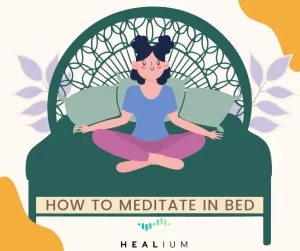
Step 1: Get comfortable! Whether you’re laying in bed or sitting up, find a comfortable position free of any and all distractions. You’ll want to be completely focused and within your own mind throughout your bedtime meditation session.
Step 2: Concentrate on your breathing at first, taking deep breaths, and then allowing yourself to settle into a natural rhythm.
Step 3: Instead of attempting to isolate yourself from the rest of the world, allow yourself to become aware of your surroundings, but only as an observer rather than as a participant in them.
Step 4: As thoughts begin to enter your head, let yourself acknowledge them and then allow them to pass by, separating yourself from the past and future and concentrating entirely on the present now.
Step 5: As you feel yourself becoming more mindful and relaxed, hold on to those feelings as long as you can. It may be tough to sustain this degree of concentration at first, but that is normal. The more you practice, the more quickly you will be able to go into a relaxed and present state, allowing your mind to stop racing and your body to naturally assist you in falling asleep once you have completed your session.
A mental fitness tool, Sleepium is a new, active meditation app driven by your brainwaves, designed to improve your mental fitness. Train your brain with real-time data so that you can better regulate your anxiety, concentrate more intensely, and sleep better at the same time.

Your brainwaves will be represented as a glowing orb we call the firefly, with an additional white line that represents your brainwave baseline. By providing you with actionable data on your brain, we give you the tools to practice neurofeedback at home and achieve better sleep!

Sleepium is designed for virtual reality headsets and utilizes neurofeedback, so you’re simultaneously immersed in the meditation experience while also capturing and training specific brainwaves associated with stress and anxiety.
We recommend you utilize the optional neurofeedback wearables throughout your meditation sessions during the day, while simply laying back and enjoying the meditation experiences without neurofeedback wearables in bed at night.
In addition to Sleepium sleep meditations, there are four additional meditation categories on Healium:
Focus – increase your attention span
Calm – lower your stress and anxiety levels
Mindfulness – be more present at the moment
Positivity – shift your mindset towards the glass half-full
No VR Headset? No problem! With a smartphone or tablet and the Healium app (compatible with iOS and Android devices) you can train your brain on the go.
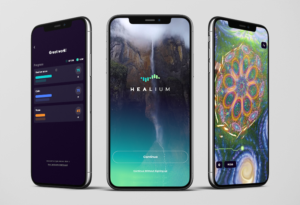
Here are our favorite samples of virtual reality and augmented reality stories designed to ease you into a restful state in a VR headset for 360-degree views.
You can do a few other things to make the most of your meditation experience and get the best night’s sleep possible.
First, try not to eat or drink anything caffeinated at least four hours before bedtime. Caffeine is a stimulant that can keep you awake and make it harder to fall asleep.
Second, avoid drinking alcohol before bed. While it may make you feel drowsy, alcohol disrupts sleep and can lead to wakefulness later in the night.
Finally, create a relaxing environment in your bedroom that promotes sleep. This means keeping the room dark, quiet, and calm. Consider investing in blackout curtains or an eye mask to block light, using earplugs or a white noise machine to drown out the noise, and sleeping on a comfortable mattress and pillows.
With these tips in mind, you can create the perfect conditions for a restful meditation session before bedtime that will help you sleep better at night.
If you want to learn how to meditate in bed properly, the best way is to try Sleepium. Our app has a wide variety of guided meditation experiences to help you relax and fall asleep. We also offer real-time data to see how your brain is responding to the meditation and make adjustments accordingly.
{“@context”:”https://schema.org”,”@type”:”FAQPage”,”mainEntity”:[{“@type”:”Question”,”name”:”How to Meditate in Bed?”,”acceptedAnswer”:{“@type”:”Answer”,”text”:”Step one: get comfortable! Step two: Concentrate on your breathing, taking deep breaths. Step three: Allow yourself to become aware of your surroundings. Step four: Acknowledge thoughts and let them pass. Step five: Hold on to feelings of mindfulness and relaxation. “}},{“@type”:”Question”,”name”:”Does Meditating In Bed Help Sleep?”,”acceptedAnswer”:{“@type”:”Answer”,”text”:”Meditation helps improve sleep conditions by adjusting brainwaves and alleviating internal stress and anxiety, which has been a well-documented strategy for those looking to gain quality rest.”}},{“@type”:”Question”,”name”:”Should You Meditate Before Bed or in the Morning?”,”acceptedAnswer”:{“@type”:”Answer”,”text”:”This depends on what you’re trying to accomplish, as well as the type of meditation you are performing! There’s nothing wrong with practicing mindfulness meditation both at night and in the morning, but if your goal is better sleep it may be more beneficial to practice your meditation before bed to help your brain and nervous system down shift.”}},{“@type”:”Question”,”name”:”Is it Bad to Meditate in Bed?”,”acceptedAnswer”:{“@type”:”Answer”,”text”:”Absolutely not! One essential ingredient to a successful meditation experience is to find a comfortable position to lessen potential distractions. If that happens to mean laying down in your bed, then by all means go for it!”}},{“@type”:”Question”,”name”:”Can Meditation Interfere with Sleep?”,”acceptedAnswer”:{“@type”:”Answer”,”text”:”The answer to this will depend on the style of meditation you’re practicing, but generally speaking, no, meditations will not interfere with your sleep. In fact, studies suggest the lessened stress and anxiety resulting from meditation will actually contribute to better sleep overall. “}}]}
Sarah Hill, a former interactive TV news journalist at NBC, ABC, and CBS affiliates in Missouri, gained recognition for pioneering interactive news broadcasting using Google Hangouts. She is now the CEO of Healium, the world’s first biometrically powered VR/AR channel, helping those with stress, anxiety, insomnia, and other struggles through biofeedback storytelling. With patents, clinical validation, and over seven million views, she has reshaped the landscape of immersive media.
My 17 year old daughter was in a car accident last Thursday morning.
It was the first day this year with Black Ice, and as she proceeded down the onramp of the highway, she slid in and out of two lanes of traffic until a guard rail on the opposite side of the highway finally stopped her vehicle.
The impact of the accident was enough to pop her tire, bend her wheel well & remove the bumper & mirror on her driver’s side.

We found out later that day that it also punctured the radiator & transmission. We watched in shock as the tow truck driver hauled her car to the shop to see if it could be repaired and for some reason, she didn’t want to come home & rest. She was insistent that I take her straight to school as she couldn’t miss any “class time” during her Senior Year or her GPA may drop and she would lose her college scholarships.
Later that day, my mom picked her up from school and took her to work which she was determined to go to because she didn’t want to lose the money. While she was at work, we found out that her car would be totaled as the repair costs far exceeded the value of the car, unfortunately, I had only carried liability insurance on her car so she would now have to rely on us to take her to and from places until we can save up for a new car.
She returned home from work, ate dinner & started to do her homework and within 15 minutes she was having a full panic attack.
She came running upstairs to find me complaining that she had something stuck in her throat and that she couldn’t catch her breath.
After a quick assessment, I could tell that she wasn’t choking on anything but that she was having a full-blown panic attack like the ones she had when she was a child. She was literally so worked up from stress that she couldn’t fully swallow or take in a full deep breath.
As I tried to calm her down and debated taking her to the ER, I somehow remembered the Healium app & thought it was worth a try as she was wearing her Apple Watch, so I grabbed her iPhone and downloaded the app. Within 60 seconds she was watching the first exercise of the plant growing & the butterflies starting to hatch.
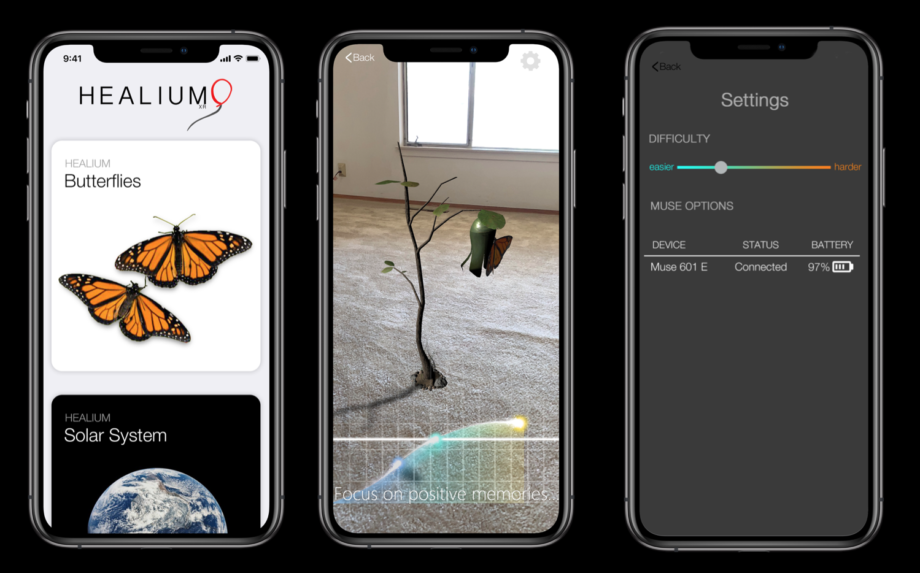
I sat there in awe watching as she listened to the calm voice on the app, followed all of the instructions and after another minute she was able to keep her heart rate down enough to hatch 3 butterflies. After another minute she sat down on the bed beside me to show me all of the butterflies that she had hatched. She could breathe, she could swallow, she was calm, smiling, laughing and we were both at a state of peace for the first time that day.
We are truly blessed that she walked away from the accident with not even a scratch, but the anxiety from the impact of the accident, the trauma from the loss of her car and the pressure she had put on herself to keep pushing through her day was way too much for any adult to deal with let alone a child. There is nothing more overwhelming as a mother than watching your child suffer to breathe knowing that you can’t fix it.
I will be forever grateful for the gift you gave us that night with your app. It was the best $4.99 that I have ever spent and the whole world needs to know about it.
–Beth
For more information about Healium’s augmented and virtual reality apps, please visit https://www.tryhealium.com/buy